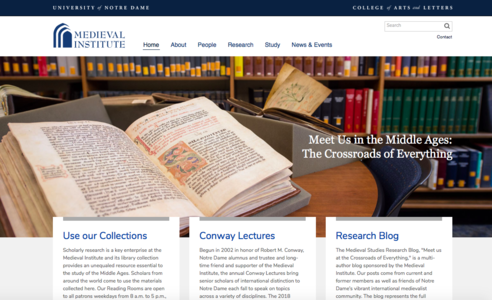Medieval Institute Launches New Website
If you googled the Medieval Institute during the last few weeks, you arrived at our crisp, glorious new website with its beautiful photos of our spaces, books, and people, and its invitation to “Meet us in the Middle Ages: The Crossroads of Everything.”
Whether you're new to our community of medievalists or are a longtime member, we invited you to browse and learn more about the MI. We've added a lot of new content, especially about recent initiatives at the MI.
If you click “Research” on the main menu, you’ll find a link to our research blog called “Meet us at the Crossroads of Everything.” This is the former “Chequered Board” blog integrated now directly into our site and ready for all of our faculty and students to use, whether as part of a class assignment (there’s a great post right now on how to do this), or to contribute to one of the on-going series, such as “Working in the Archives,” or to foreground some aspect of your current research.
Also under “Research,” you can connect to the “Working Groups” page to learn about two new (“Jewish and Christian Books in the First Millennium,” “Emotions”) and two recurring MI-funded faculty/grad-student research groups.
We've added new directories to help you find members of our MI community. We've also redesigned our News and Events feeds and added all of our social channels (including our NEW YouTube channel) so you can easily follow us on Twitter, Facebook, and YouTube.
But make sure, though, that you also scroll to the end of the “Home” and “Study” pages, where you’ll find a recurring series of reminders—in Latin, Greek, Hebrew, and Arabic—of why we do what we do at the MI, including Hugh of St. Victor’s famous admonition to “Omnia disce. Videbis postea nihil esse superfluum. (Learn everything, and you will see afterward that nothing is superfluous.)”
There is a lot that is new around here, but only in service of the MI’s now seventy-year long mission: the interdisciplinary study of medieval civilization in all its linguistic complexity, social multiformity, manuscript variety, intellectual richness, and literary imaginativeness. Thanks to all faculty, students, and friends who have joined us at this vast, unexplored crossroads!
